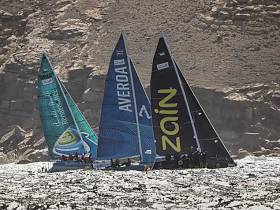Displaying items by tag: EFG
Baker & Espey Battling Hard in Sailing Tour of Arabia
Northern Ireland sailors Andrew Baker and James Espey are fighting hard in the Sailing Arabia Tour onboard Team Averda but it is a veteran crew that saw off spirited attacks from rivals Team Al Mouj Muscat (OMA) and Team Zain (KUW) to seal the top spot in the 153-nautical mile sprint from Khasab on Oman's Musandam Peninsula to Abu Dhabi.
The triumph, their second in three legs, is all the more impressive given the hurdles EFG Bank Monaco faced on the leg – at one point their Farr 30 racing yacht became entangled in a fishing net, causing them to lose the lead to Team Al Mouj Muscat, but they were able to recover and overhaul their rivals in the early hours of this morning.
It puts the three-time winners of EFG Sailing Arabia – The Tour, led by Frenchman Thierry Douillard and including former match racing world champion Mathieu Richard, 4 points clear at the top of the overall standings with two offshore legs and two in-port race series remaining.
“It was a great leg – we had a good start sailing around the beautiful Musandam coastline and we were fast,” Douillard said.
“We sailed solidly and were leading at the first gate just as night came. We then had some issues with fishing nets... we were caught for quite a while by a big one and slipped back to fourth. We fought back very hard because we knew we would be reaching at the end of the leg with little opportunity to overtake. I'm very happy with the job the boys did.”
Team Al Mouj Muscat notched up another second-place finish, coming in just eight minutes adrift of EFG Bank Monaco's winning time of one day, two hours and 55 minutes.
But the biggest celebrations came from Team Zain, who scored their first podium result after having to settle for fourth in the two opening legs.
“We're absolutely delighted with the result,” said Team Zain crew manager Mike Miller.
“At one point we were actually leading but as we came into the home strait the professional crews took us to the cleaners. Thankfully we were able to hang on this morning and score our first podium of this year's race. It was hard work but we really deserve this result.”
Behind the top three an intense battle raged for fourth place between Leg 1 winners Team Renaissance (OMA), race newcomers Adelasia di Torres (ITA) and Bienne Voile (SUI).
After more than 26 hours at sea the three crews finished within 90 seconds of one another, Team Renaissance coming home just ahead of Bienne Voile and Adelasia di Torres.
Team Averda (GBR) took seventh place ahead of all-female crew DB Schenker (GER) in eighth.
The teams now have a day in the UAE capital city to recover before racing resumes on Wednesday morning with Leg 4, the penultimate stage of the 763nm Arabian classic that will see the fleet race to Doha, Qatar, a 160nm stage with another night – if not two – at sea.
Once in Doha the teams will contest the second in-port race series of EFG Sailing Arabia – The Tour, a vital opportunity to score points before the final offshore leg to Dubai which begins on February 26 and a last in port race.
Results of Leg 3:
EFG Bank Monaco (MON/Thierry Douillard) – 1.5 points
Team Al Mouj Muscat (OMA/Christian Ponthieu) – 3 points
Team Zain (KUW/Cedric Pouligny) – 4.5 points
Team Renaissance (OMA/Fahad Al Hasni) – 6 points
Bienne Voile (SUI/Lorenz Mueller) – 7.5 points
Adelasia di Torres (ITA/Renato Azara) – 9 points
Team Averda (GBR/Andrew Baker) – 10.5 points
DB Schenker (GER/Annemeike Bes) – 12 points
Overall results:
EFG Bank Monaco (MON/Thierry Douillard) – 5 points
Team Al Mouj Muscat (OMA/Christian Ponthieu) – 9 points
Team Renaissance (OMA/Fahad Al Hasni) – 11.5 points
Team Zain (KUW/Cedric Pouligny) – 14.5 points
Adelasia di Torres (ITA/Renato Azara) – 23 points
Bienne Voile (SUI/Lorenz Mueller) – 26.5 points
Team Averda (GBR/Andrew Baker) – 27 points
DB Schenker (GER/Annemeike Bes) – 27.5 points





























































